Which things do you really need to homeschool on the road? (Some call this form of homeschooling travel schooling, road schooling, or worldschooling) What books, supplies, materials, equipment and resources do you need to carry with you? It’s not much. I’m not going to write a list. I’m not going to make you buy things so that I earn a commission. I’m just going to tell you, honestly because we were homeschooling on the road from 6 years old to almost the end of high school. And it worked.
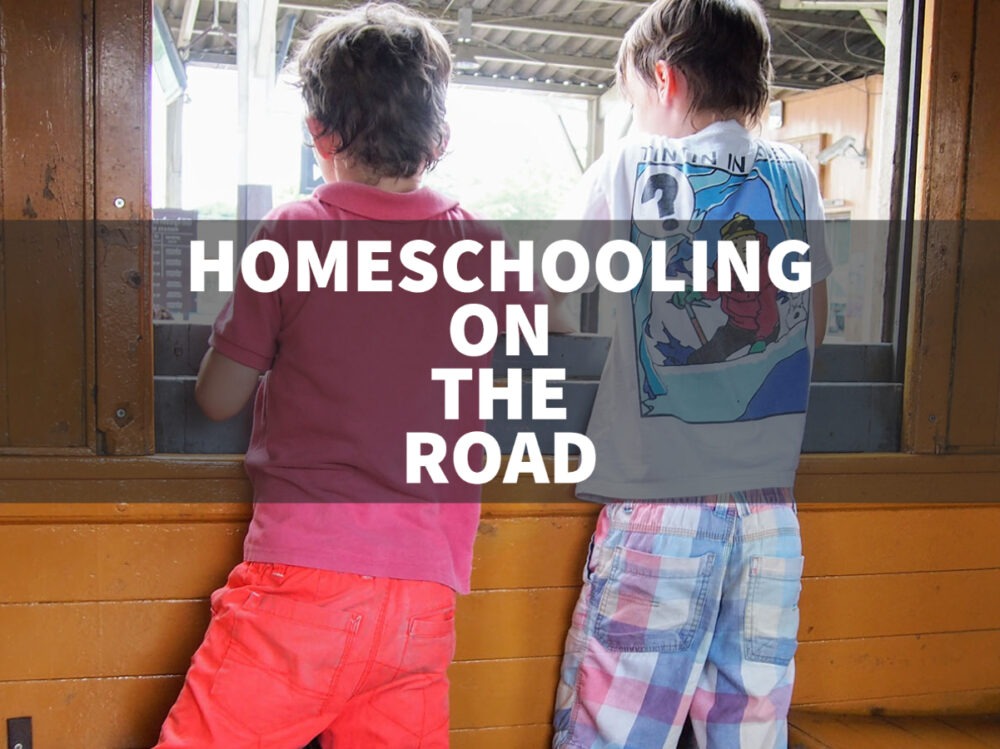
We were homeschooling on the road for over 5 years. Before that, we were more conventional bricks-and-mortar homeschoolers, registered and approved by the government. We’re huge fans of this educational model.
My boys are now teens and they’re doing just fine, so we have a fair bit of experience in alternative education behind us. You can call it worldschooling, unschooling or homeschooling, I don’t mind.
We certainly worldschool, in that we take a lot of our education from the world around us and actively seek out learning opportunities.
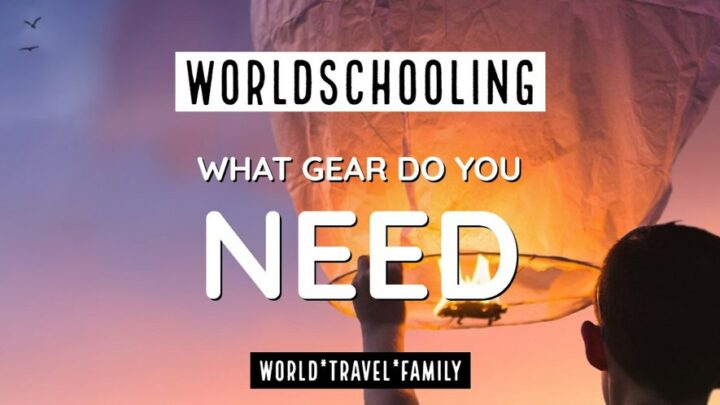
We unschool somewhat in that we hardly consider the conventional school system at all. My boys, most likely, will not re-enter the school system, unless it is their choice. But our learning is not solely child led, so that means we can’t be unschoolers.
We were not tied by school curriculum, timetable, or lessons under British law. But, our worldschooling journey started in Australia, in Queensland, because we lived there when the boys were very young. In that situation we did have to follow the state curriculum – in our own way – and submit plans and reports. We homeschool in that we do education, at home.
I don’t get hung up over name tags and tedious definitions, I tend to use homeschool as an umbrella term. In the UK they prefer the term home education, to distance homeschoolers from the school completely. Sure, we do that too.
Yes, we do some written work, but not so much. We don’t do lessons, we don’t have a schedule, we just do what we feel like doing, when it fits with what we’re doing and somehow everything just works.
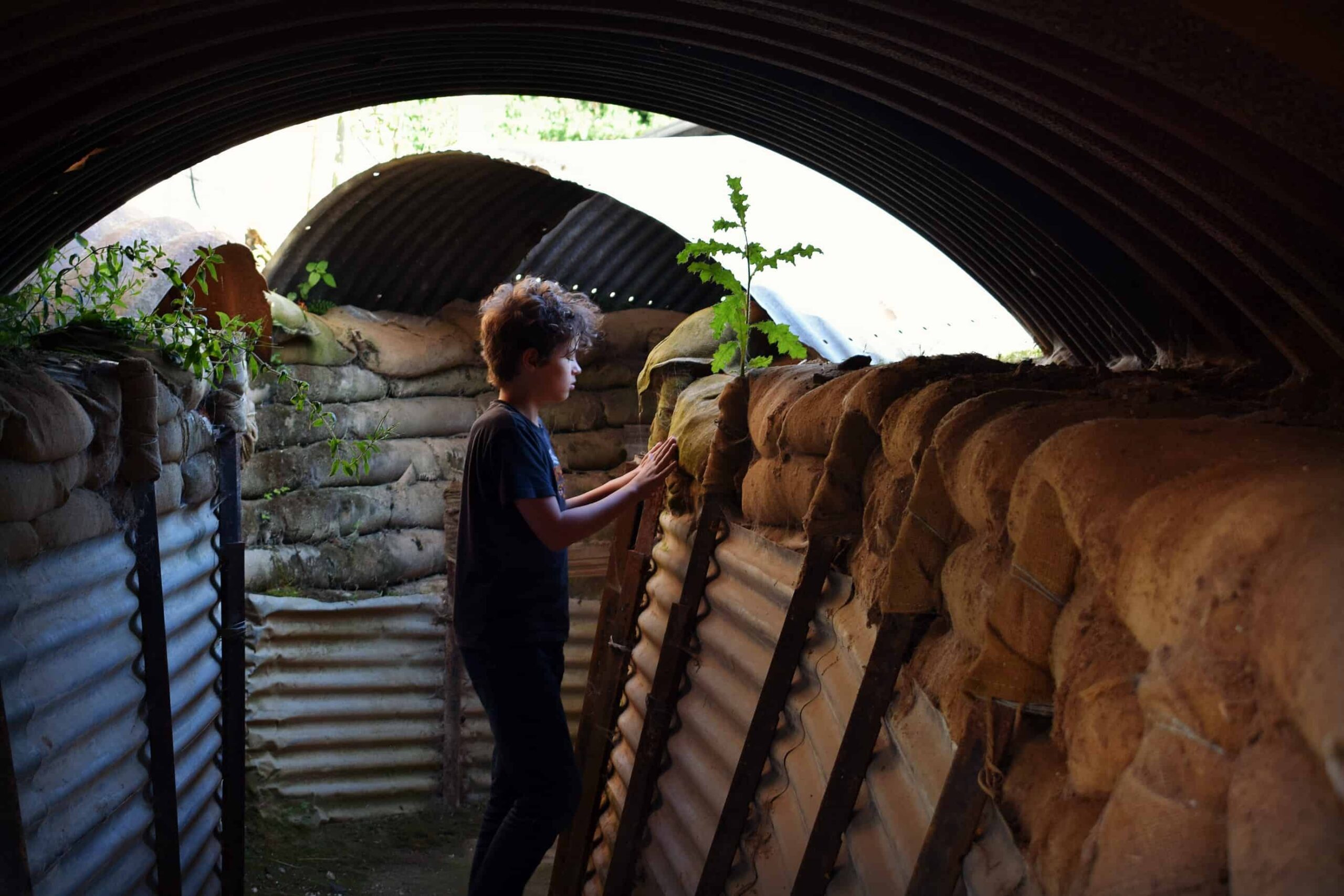
Everything in this post is honest personal opinion based on our own experiences over the years we were raising the kids.
Homeschooling On the Road. Gear/Equipment
I’ve spotted a few of these posts on Pinterest, shopping lists for new homeschoolers or worldschoolers recommending this travel journal and that i-thingy. They read like shopping lists, because that is what they are, long lists of must-haves to get you to spend money on Amazon.
Amazon affiliate links are all well and good, I use them, but I’m never going to knowingly tell you to buy something you don’t need.
These are our, bare minimum, list of things you need to homeschool on the road.
Distance Education and Travel
Distance Education is really not considered homeschooling by many. It’s school, without bricks and mortar.
I’ve never tried it, but of all my friends who have, every one of them, found it too restrictive to use in a travel environment. You will need materials posted to you, scheduled lesson times, and lose all your spontaneity.
My boys joined an online international school when they were older teens in lockdown. Online schools are great so long as you’re not travelling, but they’re not homeschooling. This option is expensive, but it was the route we took for them to get exam passes, fast.
The Most Important Thing? Play and Time
Study after study proves that all work and no play make Jack a dull boy.
Give them time for their own explorations in whatever way they choose. Be present, don’t shut yourself off from them with phones and gadgets. Without those two things it just won’t work.
Homeschooling on the road should be fun and should give your kids plenty of time to just be kids and explore those valuable locations.
Reading Materials for Homeschooling

It is absolutely, 100% essential to provide your child with books along with abundant time to read them. This has to be the number 1 most important thing you can possibly do for your child.
From read-alouds, to young readers to comics, to meatier books, give them books and time and they will learn.
If you can access public libraries in an English-speaking country, perfect. If you are travelling in parts of the world where English isn’t the first language, you will struggle.
In some countries, for example, Sri Lanka, you will find books for kids in English, but they may be hard to track down.
In the olden days of travel, second-hand book stores and exchanges were common. They still exist, but they are fewer and of course, children’s books aren’t widely available as hardly any kids escape school to backpack the world. This is why our family owns 4 Kindles.
Our choice was the Kindle Paperlight. We felt that if the kids were to own a Kindle Fire, they’d spend all that valuable time gaming and not reading. A Kindle is a book and that is all.
Paper and Writing Materials
Carry a stash of pencils, with rubbers (erasers) on the end. You can’t lose a rubber when it’s attached. You’ll also need a pencil sharpener, a small ruler and coloured pencils.
Felt tip pens are great but the risk of leaks in a backpack is too great, our felt tips (texters) stay at home base.
Give your kids a sketch pad for their own art and a notepad for their own writing, games or maths.
It is best to carry pencils in a soft pencil case, we started this journey with a plastic box, it was too bulky.
A lot of people will suggest that your child will, or should, keep a daily travel journal. Well, my boys would rather extract their own teeth than do that, so don’t be surprised if it’s a non-starter.
Just give them a notepad and empty time, let them do what they like with it. If you really want a travel journal, check this one out by Lonely Planet.
I love that now, if we go anywhere and know we’ll have no signal, my teenager will always pack his sketch pad and pencils. He’s getting pretty good. If he needs a tutorial he’ll find one on YouTube.
A Computer is Essential for Homeschooling
We travel with 4 laptops now if we’re doing any sort of long-term or slow travel. Mine is off-limits for kids these days. I need it to work and to plan, so they need their own and 1 each stops fights.
We prefer laptops over tablets or i pads because we find their use easier to regulate.
When they were little, of course, they didn’t have any devices other than Kindles and if they were to do some online learning or leisure stuff, mum’s laptop was it.
We never wanted the kids to have the option of gaming on trains and planes, we wanted them to read or be present with us, so it’s easiest if no handheld devices, other than the Kindles, exist. Because they never had it they never missed it.
At one point we bought them a cheap tablet each, it didn’t add to anyone’s happiness and there were frequent cries of “I’m bored!” Which in kid speak means “I want the tablet!”. We were glad when they broke, quickly.
Of course, it’s age dependent. Both boys are older now and have phones but they’re well and truly hooked on reading and know that the world is bigger than that screen, so it works.
Laptops are only for our use in home base of hotel rooms, so, by limiting online access, for all four of us, we remain engaged with each other and what’s going on around us.
My elder son owned a Nintendo 3DS, which is less addictive than tablet gaming. He used it surprisingly infrequently for that purpose. He’d more likely use it as a still or video camera or to play music.
For travel try to get a smaller laptop for travel, ours are now smaller than the original laptops we set off with and it does make a big difference. For teens or tweens you need something decent for gaming and video work, the cheap ones just don’t cut it with modern technology.
What Your Homeschooler Can Do With a Computer
Sorry, I don’t mean to state the obvious to the initiated, but non-homeschoolers might not understand how we roll.
- Learn to use a computer well, that is pretty essential!
- Access YouTube documentaries on just about any topic, from Simple Machines to World War 2.
- Listen to music from any era.
- Check out artists, historical and modern.
- Do their own research on any topic that interests them.
- Photo, video and graphic design work
- Learn to type.
- Learn to code or programme.
- Talk to online friends and relatives back home or virtual.
- Create their own blog and start earning some pocket money.
- Complete online courses (we like Minecraft Homeschool, Artventure, Khan Academy, Study Ladder, and free Open University courses).
- Play computer games, because they DO have educational benefits as well as being the most fun, ever.
- Follow online learning programmes such as Reading Eggs, Study Ladder or the excellent, and free, Khan Academy
That’s just a taster, there is so much more.
My boys didn’t need their own laptops until maybe 10-12 years old. To that point they just had Kindles. Likewise phones. They got our cast-offs around that age too, for Pokemon Go (which is fabulous for travel!) photography, DuoLingo and Busuu ( he’s learning Welsh and French, for fun!) and music.
Once the real interest in photography started my elder son got a good phone. I think it’s best to follow their lead and give them what they need.
Quality is important, the games these kids play today require top-end gaming laptops. Being in an online school now (which is not homeschooling on the road, but I thought you’d want to know) they have to have very good laptops and microphones.
They both have two computer screens, it’s not essential but it helps. Their very good knowledge of how to use technology has been very useful in an online school environment. They’ve also both used online tutors via their laptops.
Workbooks for Homeschooling
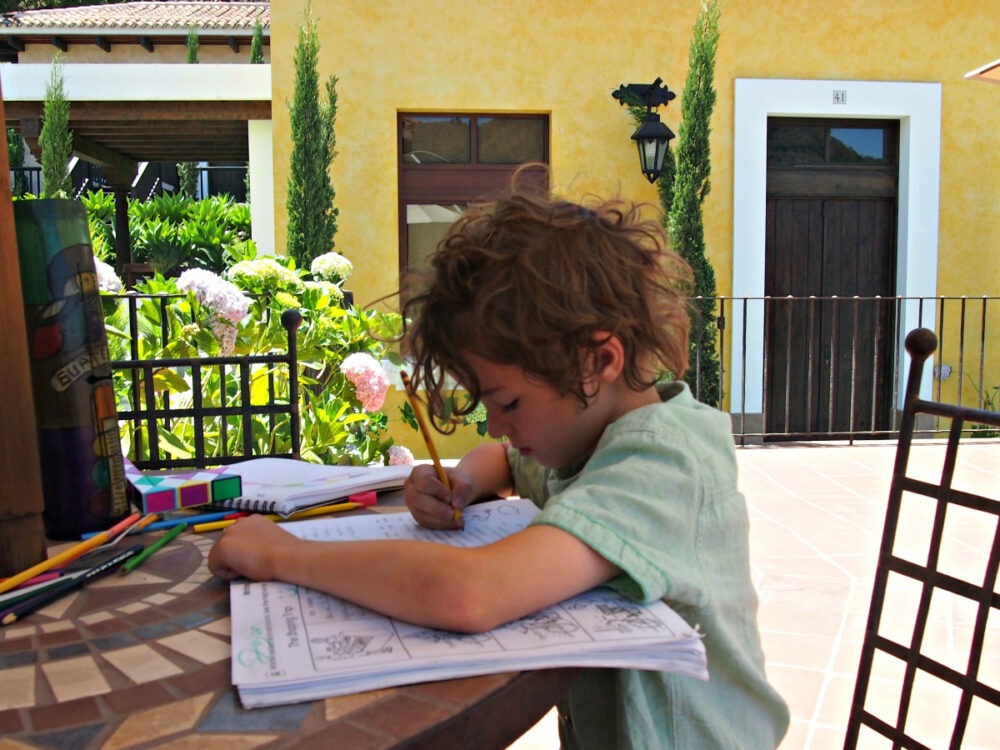
I tried to have a workbook or two with us at all times, this meant stocking up when we were in the UK or getting Amazon deliveries whenever possible. We were able to access British GCSE workbooks on Amazon Australia.
My younger one very much enjoyed Carol Vorderman’s series of Science workbooks, he whizzed through them in no time and they were a great way to get him writing. The elder doesn’t much like workbooks at all, but of those we’ve tried, the Enchanted Learning series was a winner.
We don’t use workbooks often, they are for downtime, or “bored” moments. The boys are usually too busy learning in their own ways.
If you’d like more links to the above workbooks, they’re in our homeschool and travel post. You’ll find much more detail there.
Could you save this to Pinterest? My son learning from the world. An old monk in Cambodia, a good foodie friend in Malaysia. It’s not about just parents, it’s about the people they interact with every day. The more people the better. You just can’t do this in a classroom.

Online Learning Programmes
Two we’ve used and found worth paying for, were Reading Eggs (free trial here) in the early days, and Study Ladder, which we used to about 10 years old. Around that age, Khan Academy became a better option and Khan is free.
These 2 are available in Australian, US and UK versions, click-through above.
It’s great to have something to fall back on, that we can access from anywhere in the world.
The boys use or used, both, for fun from time to time and now I use them to know that we are on track, we’re up to date, or ahead, of what the schools might be doing.
At one time we added Artventure, art classes for kids, to our arsenal and Minecraft Homeschool courses.
My elder son is now taking Open University courses and pretty much does them on his own and enjoys them. But I always do have to give him a bit of a shove, he wouldn’t do those above all else. He’s mentioned doing a marine biology degree – maybe he will, maybe he won’t, his call. We have plenty of time to figure that out.
You Really Don’t Need Anything Else
Even the workbooks and online learning programmes are optional. From time to time we’ve carried books with us (you’ll find some of our favourite educational kids’ books in this post) it’s nice to have a real book to share sometimes.
We tend to treat books as disposable, passing them on or leaving them behind for others to enjoy. We photograph completed workbooks just to have some evidence of education should we ever need it.
It’s great to have a few other educational props with you, such as,
- A small compass to help learn directions.
- Binoculars to spot birds and animals.
- Lego is always good, but beware, Lego collections spiral out of control quickly!
- Sewing equipment or other makes.
As homeschoolers, we have all the usual educational props stashed at home. From circuit sets to globes to chemistry equipment but you can’t, and don’t need to, carry them with you.
But really, you don’t need much at all, the internet has everything, from chemistry experiments to language courses. Most of it, is free.
A lot depends on your child, maybe yours likes colouring books or crosswords. Give them what they enjoy or try to get them doing Sudoku or word searches alongside you. When mine were small the only way I could get them colouring was if I started it, they would join me. Colouring was never their jam. Mine write online. The elder one is now a paid, professional writer on this site, he can do that without years of forced essay writing, so obviously, chill. It should all be fine. I do not have two easy students, it has been hell at times, but things seem to have worked out OK. Don’t forget to choose your favourite Pinterest image by using the button below.
Just take a child’s natural curiosity, place it in a whole world of learning opportunities, and nature should take its course.
My boys did eventually start school, right at the end of high school, learn why and how that went here
If you'd like to hire a car during your stay, use this car rental comparison tool to find the best deal!
We also suggest you take a look at this company to get a quote for all kinds of the more tricky adventure or extended travel insurance.
Try Stayz / VRBO for an alternative way to find rentals on homes/apartments/condos in any country!



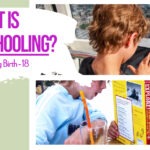

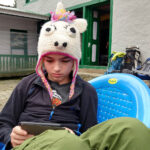



Which internet do you use?
Whatever is available, all hotels and restaurants have free wifi. Back in the day we just used that. These days we either buy a SIM on arrival at the airport or buy an eSIM from here,
They can be for a country or region. So you can buy one for the whole of Europe or Asia or whatever.